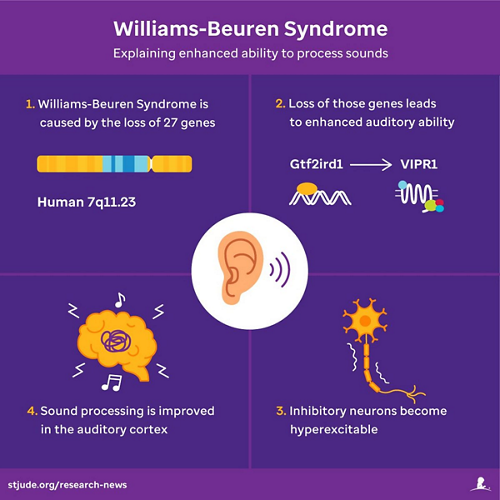St. Jude Family of Websites
Explore our cutting edge research, world-class patient care, career opportunities and more.
St. Jude Children's Research Hospital Home

- Fundraising
St. Jude Family of Websites
Explore our cutting edge research, world-class patient care, career opportunities and more.
St. Jude Children's Research Hospital Home

- Fundraising
VIPR1 modulators for improving auditory capabilities (SJ-22-0023)
St. Jude Reference #SJ-22-0023
Description
Researchers at St. Jude identified the mechanism by which Williams-Beuren syndrome (WBS (a rare disorder that causes neurocognitive and developmental deficits)) enhances the ability to discriminate between sounds as interneuron hyperexcitability in the auditory cortex- a novel molecular mechanism that explains why patients with WBS, have musical and auditory abilities are preserved or even enhanced. Understanding the causes of these superior auditory abilities in WBS patients may provide a target for treating the disease in addition to helping advance research on the ability to discriminate between sounds. WBS offers insight into the mechanisms that underlie enhanced auditory abilities. For instance, some people with WBS have perfect pitch, which is the ability to differentiate between notes or frequencies without a reference guide.
The scientists found that the transcription factor Gtf2ird1, encoded by one of the 27 genes lost in those with WBS, regulates VIPR1. Deleting or overexpressing VIPR1 in the auditory cortex can mimic or reverse the auditory effects seen in WBS. Thus, it is Gtf2ird1 downregulating VIPR1 that is responsible for the impact of WBS on auditory ability. Their publication also describes effects of commercially available VIPR1 agonist [Ala11,22,28]-VIP and antagonist PG 97-269.

Keywords
Williams-Beuren syndrome (WBS), auditory cortex, musical abilities, auditory abilities, perfect pitch, Gtf2ird1, VIPR1, [Ala11,22,28]-VIP, PG 97-269.
Granted patents or published applications
Related scientific references
Christopher M. Davenport, Brett J.W. Teubner, Seung Baek Han, Mary H. Patton, Tae-Yeon Eom, Dusan Garic, Benjamin J. Lansdell, Abbas Shirinifard, Ti-Cheng Chang, Jonathon Klein, Shondra M. Pruett-Miller, Jay A. Blundon, Stanislav S. Zakharenko, “Innate frequency-discrimination hyperacuity in Williams-Beuren syndrome mice,” Cell, Volume 185, Issue 21, 13 October 2022, Pages 3877-3895.e21. https://doi.org/10.1016/j.cell.2022.08.022
Press release: https://www.stjude.org/media-resources/news-releases/2022-medicine-science-news/findings-explain-exceptional-auditory-abilities.html
Licensing opportunities
We are seeking partners to license this technology who would further develop means of manipulating VIPR1 expression or function to improve auditory capabilities in humans (e.g., musical professionals) or treating amusia (tone deafness), which affects up to 4% of population. Contact: chad.riggs@stjude.org
Contact the Office of Technology Licensing (Phone: 901-595-2342, Fax: 901-595-3148) for more information.